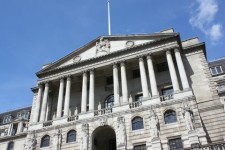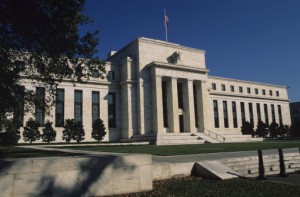Archive for the ‘Central Banks’ Category
Thursday, August 18th, 2016
 The yen strengthened beyond 100 per dollar for a second time this week as the U.S. currency’s bid to break out from a three-month low stalled after Federal Reserve minutes indicated officials were divided over the urgency to raise interest rates.
The yen strengthened beyond 100 per dollar for a second time this week as the U.S. currency’s bid to break out from a three-month low stalled after Federal Reserve minutes indicated officials were divided over the urgency to raise interest rates.
A gauge of the dollar has fallen more than 5 per cent this year as investors bet the Fed will raise interest rates at most once this year, compared with policy makers’ forecasts at the start of 2016 for four increases.
That means the U.S. central bank is less likely to diverge from the Bank of Japan and European Central Bank, which are boosting stimulus to spur flagging growth.
(more…)
Tags: bank of japan, central, Federal reserve, japanese yen, usd, USD/YEN
Published in Central Banks, Currencies, Dollar, News, Uncategorized, Yen, usd | No Comments »
Thursday, August 11th, 2016
 New Zealand’s dollar surged to the highest since May 2015 after traders deemed the central bank’s decision to cut borrowing costs was insufficiently dovish amid the global ardour for yield spurred by unprecedented global monetary easing.
New Zealand’s dollar surged to the highest since May 2015 after traders deemed the central bank’s decision to cut borrowing costs was insufficiently dovish amid the global ardour for yield spurred by unprecedented global monetary easing.
The kiwi climbed against all of its 16 major counterparts after the Reserve Bank of New Zealand cut its official rate to a record, aping the reaction of its Australian counterpart when officials there lowered borrowing costs earlier this month.
Some investors had been looking for a more aggressive easing signal from the central bank, which indicated it would cut rates at least once more to boost weak inflation. The US dollar advanced against the euro after last week’s better-than-expected jobs data bolstered a view that the Federal Reserve is among few central banks in developed economies whose next policy move will be to tighten.
(more…)
Tags: australian dollar, Kiwi, New Zealand, New Zealand dollar, RBNZ, Reserve Bank of Australia
Published in AUD, Central Banks, Dollar, News, Uncategorized, usd | No Comments »
Tuesday, August 2nd, 2016
 Speculators that are the most bearish on sterling in nearly 25 years may be vindicated by a report published on Monday (August 1) showing Brexit is probably hitting Britain harder than markets previously envisaged.
Speculators that are the most bearish on sterling in nearly 25 years may be vindicated by a report published on Monday (August 1) showing Brexit is probably hitting Britain harder than markets previously envisaged.
Sterling declined versus most of its 16 major peers as the data showed UK manufacturing shrank more than initially forecast in July.
Hedge funds and other large speculators ran the biggest net short positions, or bets on the currency’s decline, since records began amid speculation that the Bank of England will cut interest rates for the first time in more than seven years on Thursday, August 4 to head off the risk of recession.
(more…)
Tags: bank of england, BoE, Brexit, eu, EUR/GBP, GBP/USD, pound sterling
Published in Central Banks, Currencies, Dollar, Euro, GBP, News, Political, Uncategorized, usd | No Comments »
Tuesday, July 26th, 2016
 The yen rose more than 1 per cent against the dollar and the euro on Tuesday (July 26), as traders dialled back expectations of how much new stimulus Japanese authorities will inject into an ailing economy.
The yen rose more than 1 per cent against the dollar and the euro on Tuesday (July 26), as traders dialled back expectations of how much new stimulus Japanese authorities will inject into an ailing economy.
The Bank of Japan is expected to announce expanded asset purchases and a rate cut further into negative territory at the end of its policy meeting on Friday (July 29).
Meanwhile the government is compiling a spending package that some sources have estimated could be worth up to 20 trillion yen. But a Nikkei report on Tuesday (July 26) said direct fiscal stimulus into the economy would amount to about 6 trillion yen over the next few years.
(more…)
Tags: bank of japan, Euro, japanese currency, USD/YEN, Yen
Published in Central Banks, Currencies, Dollar, Euro, News, Yen | No Comments »
Tuesday, July 19th, 2016
 The pound fell even as a report showed the UK’s annual inflation rate rose more in June than economists forecast.
The pound fell even as a report showed the UK’s annual inflation rate rose more in June than economists forecast.
Sterling weakened versus most of its 16 major peers. UK consumer prices climbed 0.5 per cent last month from a year earlier, the Office for National Statistics said in London. Analysts had expected the rate to rise to 0.4 per cent, from 0.3 per cent in May, according to the median estimate in a survey by news agency Bloomberg. The Bank of England’s 2 per cent inflation target was last reached in December 2013.
The Bank of England signalled last week it is readying stimulus for August as the economy reels from Britain’s decision to quit the European Union. Minutes of the BOE’s July meeting showed most members of the Monetary Policy Committee expect policy to be loosened next month.
(more…)
Tags: bank of england, Brexit, GBP, markets.com, pound sterling, UK
Published in Central Banks, Currencies, GBP, News, Political, Uncategorized | No Comments »
Wednesday, June 29th, 2016
 Scandinavia’s biggest bank estimates Denmark sold almost $750 million in kroner to weaken the currency after it became clear early on Friday (June 24) that Britons had voted to leave the European Union.
Scandinavia’s biggest bank estimates Denmark sold almost $750 million in kroner to weaken the currency after it became clear early on Friday (June 24) that Britons had voted to leave the European Union.
The flight into safe-haven markets triggered by Brexit drove the krone to its strongest level against the euro in more than a decade, forcing the central bank to intervene to defend its currency peg.
The bank probably sold about 5 billion kroner ($744 million) on Friday (June 24), according to Jan Stoerup Nielsen, a senior analyst at Nordea in Copenhagen. That follows a resumption of interventions to weaken the krone in May for the first time since February last year, when Denmark’s euro peg was under a speculative attack. Interventions in May reached 23.6 billion kroner.
(more…)
Tags: Brexit, danish krone, denmark, eu
Published in Central Banks, Currencies, Euro, News, Political, Uncategorized | No Comments »
Wednesday, June 15th, 2016

With sterling trades seen too expensive, the yen and Swiss franc are in demand according to in-depth research by news agency Bloomberg.
The UK’s referendum on European Union membership is spurring volatility in the pound, making trading sterling increasingly expensive. Banks are pointing clients toward alternative currency bets or hedges that could fare well regardless of the outcome.
Here is a list of analysts’ favourite trades as written in research notes or recommended in interviews conducted by Bloomberg News in recent days.
(more…)
Tags: Brexit, currencies, eu, European Union, UK
Published in Central Banks, Currencies, Dollar, Euro, Forex Brokers, Franc, GBP, News, Political, Trade forex, Uncategorized, Yen, trading, usd | No Comments »
Wednesday, June 8th, 2016

Australia’s dollar rose to a one-month high and bond yields rebounded from the lowest ever as the central bank refrained from cutting interest rates.
The Reserve Bank of Australia left the benchmark rate at a record-low 1.75 percent, as forecast by all but one economist surveyed by news agency Bloomberg. Most expect the central bank to resume easing in August after a quarter-point reduction in May in response to a record-low core inflation reading.
“Last night’s RBA policy statement was judged as lacking an explicit easing bias,” said Jane Foley, a senior currency strategist at Rabobank International in London. “While this assessment has lent the Australian dollar significant support this morning, there are sufficient negative nuances contained within the RBA’s policy outlook to infer that the prospect of an August rate cut remain very strong.”
(more…)
Tags: aud, aussie dollar, australian dollar, ava trade, central bank, Interest rates, RBA, Reserve Bank of Australia
Published in AUD, Central Banks, Currencies, Forex Brokers, Interest rates, News, Uncategorized, trading | No Comments »
Wednesday, June 1st, 2016

The Colombian peso weakened on Tuesday (31/5) after the country’s central bank announced it would suspend an intervention policy aimed at slowing the currency’s decline.
The central bank said on Friday (27/5) it would not hold any additional dollar option sales, but did not fully rule out further intervention.
The bank also increased its benchmark interest rate for a ninth consecutive month on Friday, to 7.25 per cent, confirming the expectations of most analysts in a Reuters poll.
(more…)
Tags: central bank interventions, Colombia, colombian peso, COP, Interest rates, latin america, real, risk, usd
Published in Central Banks, Currencies, Interest rates, News, Political, Uncategorized | No Comments »
Wednesday, May 11th, 2016

The Philippine peso rose the most in six weeks against the dollar as Rodrigo Duterte sought to ease investor concerns after claiming victory in the nation’s presidential election.
The currency also strengthened versus all of its 10 Asian peers as preliminary results showed Duterte, the tough-talking mayor of Davao city, won about 39 percent of the vote.
(more…)
Tags: Asia, Bankers Association of the Philippines, Duterte, election, National Australia Bank Ltd., Philippine Peso, Philippine Stock Exchange Index, Philippines, politics, Rodrigo Duterte, World Bank
Published in Central Banks, Currencies, News, Political, Uncategorized | No Comments »
Tuesday, July 21st, 2015
 All eyes have been understandably focused on Greece during the past week. What appeared to be a rather tenuous bailout offer has been accepted by the Greek parliament and pushed through at the eleventh hour by the European Union. While the massive €80 billion euros required to ease the financial tensions and imbue liquidity into the Greek economy may be a welcome development, many investors are still wary in regards of the long-term damage that could have already been done to the euro as a whole. (more…)
All eyes have been understandably focused on Greece during the past week. What appeared to be a rather tenuous bailout offer has been accepted by the Greek parliament and pushed through at the eleventh hour by the European Union. While the massive €80 billion euros required to ease the financial tensions and imbue liquidity into the Greek economy may be a welcome development, many investors are still wary in regards of the long-term damage that could have already been done to the euro as a whole. (more…)
Tags: eu, eurozone, greece, greek loan
Published in Central Banks, Crisis, Currencies, Euro, News, Political | No Comments »
Wednesday, March 11th, 2015

The additional liquidity offered by the European Central Bank (ECB) might pose some risks to the financial stability of the region, according to the bank’s president, Mario Draghi.
Addressing investors in Frankfurt, the president said the ECB new policy measures may have some risks, and further suppress benchmark sovereign bond in the euro zone.
(more…)
Tags: ECB, Mario Draghi
Published in Central Banks, Euro, Political | No Comments »
Monday, August 5th, 2013
 One of the biggest pieces of news to impact the online forex trading community this week has been the announcement that the latest US job figures are not as high as was hoped for.
One of the biggest pieces of news to impact the online forex trading community this week has been the announcement that the latest US job figures are not as high as was hoped for.
Despite a range of measures having been put in place by President Obama and his administration to try and improve the USA’s worrying job situation, the modest target of an extra 180,000 jobs was not met.
(more…)
Tags: European Central Bank, President Obama, USA, usa president
Published in Central Banks, Euro, Interest rates, Political | No Comments »
Wednesday, June 12th, 2013
 One of the dominating forex news stories centres around the relationship between the US dollar and the Japanese Yen. We have seen a rally, albeit perhaps briefly, against the dollar when online trading analysts learned that the Bank of Japan has not modified their domestic monetary policy as was moderately expected.
One of the dominating forex news stories centres around the relationship between the US dollar and the Japanese Yen. We have seen a rally, albeit perhaps briefly, against the dollar when online trading analysts learned that the Bank of Japan has not modified their domestic monetary policy as was moderately expected.
This decision was defended by the governor of the central bank when he stated that there is less volatility in the government bond markets than previously. This announcement led to the dollar declining 1.78 percent in comparison to the Yen during the American trading session on Tuesday. Some online traders and forex brokers believe that this leveraging of Japan’s currency and the resultant decline in equities may attract investment from abroad.
(more…)
Tags: bank of japan, Goldman Sachs, japanese currency, us dollar, USD/YEN, Yen
Published in AUD, Central Banks, Dollar, Yen | No Comments »
Sunday, December 9th, 2012
 This week’s online Forex trading news has been highlighted primarily by the fiscal conditions currently underpinning the Eurozone, with a moderate consideration regarding investors’ stances on the US dollar.
This week’s online Forex trading news has been highlighted primarily by the fiscal conditions currently underpinning the Eurozone, with a moderate consideration regarding investors’ stances on the US dollar.
While the primary concern is the United States government’s approach to the looming deficit cliff, the Federal Reserve seems to have made progress towards the latter part of the week which will help bridge the gap between the democrats and republicans. However, in Europe near term worries continue to daunt any real gains in the value of the Euro.
(more…)
Tags: Federal reserve, greece, spain, USA
Published in Central Banks, Dollar, Euro, usd | No Comments »
Wednesday, September 5th, 2012
 The Euro weakened on Tuesday, falling 0.2% against the dollar from the two month high it reached on 31st August, which had seen some investors optimistically forecasting that the currency was rallying.
The Euro weakened on Tuesday, falling 0.2% against the dollar from the two month high it reached on 31st August, which had seen some investors optimistically forecasting that the currency was rallying.
This came after the European Central Bank (ECB) stated that they will be prepared to buy bonds with maturities of up to 3 years. Despite investors welcoming this news, the fall reflects their fears that it may not be enough to contain the European debt crisis.
(more…)
Tags: bond plan, Correlation Weighted Indexes, ECB, EUR, Euro, European Central Bank
Published in Central Banks, Euro | No Comments »
Sunday, March 11th, 2012
The global currency markets accounts and balances are awaiting clearer prospects. This is due to the great concern of the now well-known Greek crisis. The crises has been temporarily mitigated by the cancellation of debts and new loans.
Greece in focus

In terms of international currencies, Greece is in focus. An agreement was signed on debts by private lenders and applies to investors holding government bonds. This has been possible since Greece decided (more…)
Tags: ECB, fukushima, greece, japanese currency
Published in Central Banks, Euro, Interest rates, Yen | No Comments »
Sunday, August 7th, 2011
A currency war has started to take place in Eastern Africa, after South Sudan launches a new currency, South Sudan Pounds. The North Sudan’s central bank also launched a new currency shortly after, in an attempt to freeze money held by the South Sudan (more…)
Tags: sudan pounds
Published in Central Banks | No Comments »
Friday, March 25th, 2011
IMF recently told the press they fail to see any underlying fundamental factors giving the Yen any strength. According to International Monetary Fund, the current value of the Yen reflects long-term fundamentals. So basically, they mean that the Yen is still overvalued against USD and rest of the G7 countries.
Surprising G7 intervention against Yen
Last week, seven central banks from the G7 countries joined together in an effort to weaken the Yen. After the earthquake, the Japanese Yen has been traded stronger, in contrast to what you would expect.
Currency traders also claim that the Yen strengths is partly due to corporations, insurance firms and private people sending money back to Japan.
What do investors buy in Japan right now?
It seems like Japanese investors mainly focus on the (more…)
Tags: japanese currency, Yen, yen dollar
Published in Central Banks, Yen, usd | No Comments »
Tuesday, October 5th, 2010

South Korea sought had some problems with speculative currency inflows the latest year, making the local currency to spike. Now, an investigations of the major banks and their forex positions will start, according to Korean Ministry of Strategy and Finance.
What kind of forex trading will be investigated?
We will put our focus on forex forwards, forex futures and forex derivate instruments. No investigation will be made for online forex trading, according to the South Korean ministry.
Purpose of the investigation?
The investigation aim to prevent excessive short term foreign currency loans, and offshore borrowing. South Korea is the 4th largest economy in Asia, and excessive capital inflow may lead to financial instability and slower recovery from the economic slowdown (more…)
Tags: south korean won, won
Published in Central Banks, Currencies, Won | 1 Comment »
 The yen strengthened beyond 100 per dollar for a second time this week as the U.S. currency’s bid to break out from a three-month low stalled after Federal Reserve minutes indicated officials were divided over the urgency to raise interest rates.
The yen strengthened beyond 100 per dollar for a second time this week as the U.S. currency’s bid to break out from a three-month low stalled after Federal Reserve minutes indicated officials were divided over the urgency to raise interest rates.


 New Zealand’s dollar surged to the highest since May 2015 after traders deemed the central bank’s decision to cut borrowing costs was insufficiently dovish amid the global ardour for yield spurred by unprecedented global monetary easing.
New Zealand’s dollar surged to the highest since May 2015 after traders deemed the central bank’s decision to cut borrowing costs was insufficiently dovish amid the global ardour for yield spurred by unprecedented global monetary easing. Speculators that are the most bearish on sterling in nearly 25 years may be vindicated by a report published on Monday (August 1) showing Brexit is probably hitting Britain harder than markets previously envisaged.
Speculators that are the most bearish on sterling in nearly 25 years may be vindicated by a report published on Monday (August 1) showing Brexit is probably hitting Britain harder than markets previously envisaged. The yen rose more than 1 per cent against the dollar and the euro on Tuesday (July 26), as traders dialled back expectations of how much new stimulus Japanese authorities will inject into an ailing economy.
The yen rose more than 1 per cent against the dollar and the euro on Tuesday (July 26), as traders dialled back expectations of how much new stimulus Japanese authorities will inject into an ailing economy. The pound fell even as a report showed the UK’s annual inflation rate rose more in June than economists forecast.
The pound fell even as a report showed the UK’s annual inflation rate rose more in June than economists forecast. Scandinavia’s biggest bank estimates Denmark sold almost $750 million in kroner to weaken the currency after it became clear early on Friday (June 24) that Britons had voted to leave the European Union.
Scandinavia’s biggest bank estimates Denmark sold almost $750 million in kroner to weaken the currency after it became clear early on Friday (June 24) that Britons had voted to leave the European Union.













